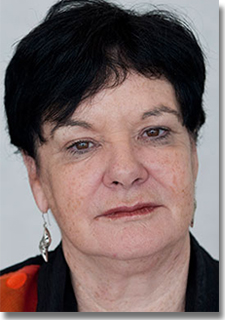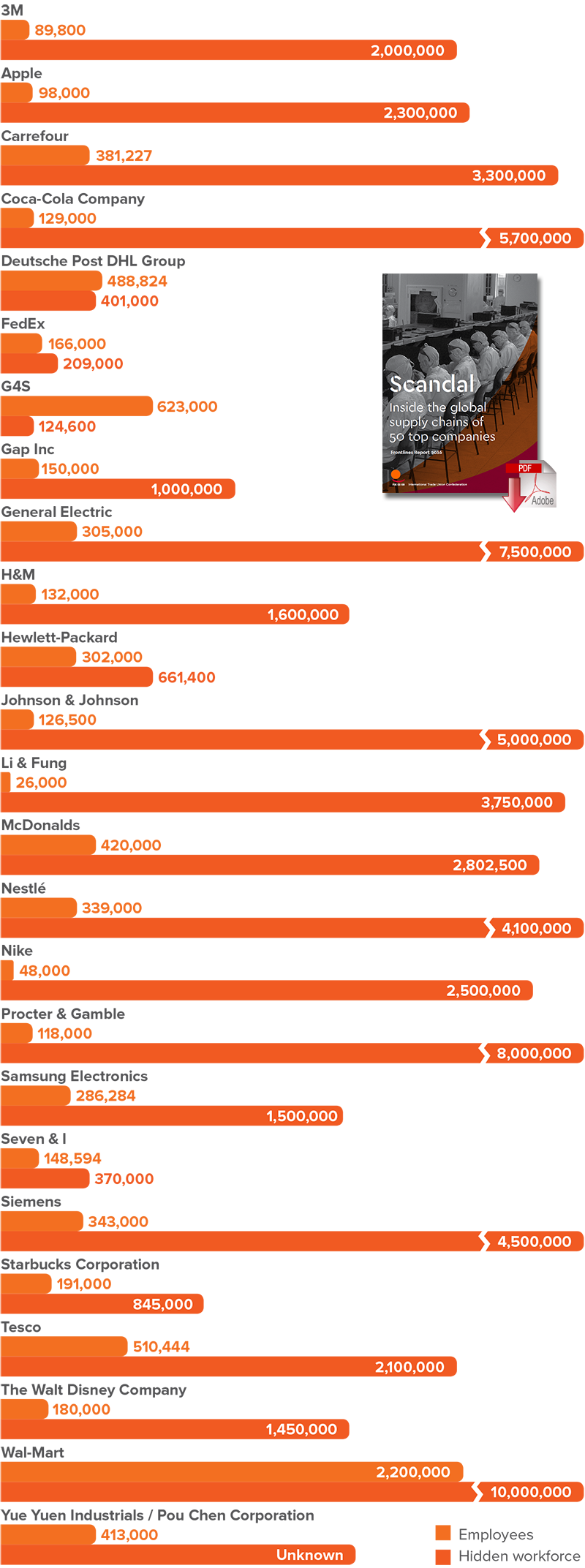
OVERVIEW
MANAGEMENT
PERFORMANCE
POSSIBILITIES
CAPITALS
ACTIVITIES
ACTORS
BURGESS
Economic Performance | |||
|
Burgess COMMENTARY | |||
|
The global supply chains of 50 companies employ only six per cent of people in a direct employment relationship, yet they rely on a hidden workforce of 94 per cent according to new research from the International Trade Union Confederation. By 24/7 Staff Scandal - Inside the Global Supply Chains of 50 Top Companies The ITUC report exposes an unsustainable business model, with a global footprint that covers almost every country in the world and profiles 25 companies with headquarters in Asia, Europe, and the United States. A new report from the International Trade Union Confederation states more than 100 million “hidden workers” exist within the global supply chains of 50 major corporations, including Apple, McDonald’s, Coca-Cola Company, Johnson & Johnson and Wal-Mart. The International Trade Union Confederation looked at 50 of the world’s largest companies - nine of them based in Asia, 17 in Europe and 24 in the United States. “Scandal: Inside the global supply chains of 50 top companies,” released by ITUC, said 6% of the workforces for these companies are “direct” employees. The other 94% of the workforce are classified as a “hidden workforce,” which are people working off the record or providing undeclared work somewhere in the supply chain. “Just 50 companies including Apple, Samsung, McDonalds and Nestle have a combined revenue of $3.4 trillion and the power to reduce inequality, instead they have built a business model on a massive hidden workforce of 116 million people,” said Sharan Burrow, ITUC General Secretary. The ITUC report, Scandal: Inside the global supply chains of 50 top companies released on the eve of the World Economic Forum in Davos exposes an unsustainable business model, with a global footprint that covers almost every country in the world and profiles 25 companies with headquarters in Asia, Europe, and the United States.
“Sixty per cent of global trade in the real economy is dependent on the supply chains of our major corporations, which uses a business model based on exploitation and abuse of human rights in supply chains,” said Sharan Burrow, ITUC’s general secretary. ITUC research shows:
“When global business won’t pay the moderate demands of workers for a minimum wage on which they can live with dignity, $177 in Phnom Penh, $250 in Jakarta, $345 in Manila – then this is knowingly condemning workers and their families to live in poverty. It’s greed pure and simple,” said Sharan Burrow The ITUC has set out five recommendations for companies to address the scandal of global supply chains:
“The number of global framework agreements between multi-national companies and global union federations which address these problems and establish a sustainable footing for the global economy are on the increase, but we still have a long way to go. Governments must not neglect their responsibilities,” said Sharan Burrow. Labour leaders at the World Economic Forum in Davos will be putting forward a four step plan to transform the business model of global companies and address inequality: Employers ensure fair distribution of wealth through minimum living wages and collective bargaining based on the fundamental guarantee of freedom of association; Safety standards are respected with workers in engaged in safety committees; Government leaders should implement and enforce the rule of law, mandating the due diligence that the UN Guiding Principles for Business and Human rights demand; Governments prioritize the dignity of the social protection floor for their people. “Only by exposing the practices of these companies to consumers and citizens around the world will companies begin to take responsibility for their supply chains and follow the rule of law,” said Sharan Burrow.
Frontlines Report 2016 - Scandal Related Companies International Trade Union Confederation Scandal - Inside the Global Supply Chains of 50 Top Companies The ITUC report exposes an unsustainable business model, with a global footprint that covers almost every country in the world and profiles 25 companies with headquarters in Asia, Europe, and the United States. By ITUC Why is the global business model in such bad shape? With global GDP having trebled in just 30 years and major corporations commanding 60 per cent of global production, transport and services through their supply chains, the respect for rights, the guarantee of minimum living wages and collective bargaining for a fair share of the profits through higher wages with safe, secure and skilled work should be the norm. Instead we have a model where companies can’t or won’t identify their supply chains and their hidden workforce. They preside over profits based on low wages, lobby against minimum living wages or regulations designed to ensure safe and secure work and turn a blind eye to the use of informal work or even slavery in their employ. Workers know it’s a scandal; their families know it’s a scandal. Governments know too but lack the courage to act. Even the CEOs of 50 of the world’s largest companies know it’s a scandal, but to admit it would be to accept responsibility. The 50 companies listed in this report could act to change the model of global trade. They have the resources and the reach. Working people pay the price of the scandal – slavery, informal work, precarious short-term contracts, low wages, unsafe work and dangerous chemicals, forced overtime, attacks by governments on labor laws and social protection, inequality – it’s all part of a great global scandal that is today driven by corporate greed with an eternal quest for profit and shareholder value. Consequently we have a business model that has lost its moral compass. For big business, labor is increasingly just a commodity and labor rights are bad for business. Just 50 companies hold a combined wealth equivalent to that of 100 nations. Our governments – even those democratically elected – are influenced by their interests.
Related Companies ... International Trade Union Confederation | |||
|
International Trade Union Confederation
February 01, 2016 / February 01, 2016 | |||
| The text being discussed is available at http://www.supplychain247.com/article/exposing_the_116_million_hidden_workers_of_50_global_supply_chain_companies/truthout and |


